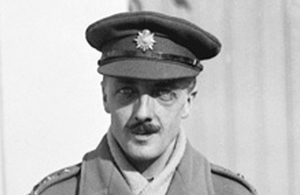WW1 Canadian VC recipient William Hew Clark-Kennedy
The story of Canadian First World Victoria Cross recipient William Hew Clark-Kennedy.

William Hew Clark-Kennedy [Credit: National Defence Canada]
70 men from Canada received the Victoria Cross, Britain’s highest award for gallantry, during the First World War. As part of the Centenary Commemorations the people of the United Kingdom marked their gratitude to those courageous men by presenting a bronze memorial plaque to their home country engraved with their names. The plaque is now displayed at the British High Commission Ottawa. This archive tells their stories.
Name: William Hew Clark-Kennedy
DOB: 3 March 1880
Place of Birth: Dunskay, Scotland
Date of Action: 27 to 28 August 1918
Place of Action: Arras, France
Rank: Lieutenant Colonel
Regiment: 24th Battalion, Canadian Expeditionary Force
William Hew Clark-Kennedy was born on 3 March 1880 in Dunskay, Scotland. He served in the British Army during the Second Boer War, and in 1902 he emigrated to Canada where he worked for an insurance company. During the First World War he was mentioned four times in despatches, received the Distinguished Service Order and Bar, was made a Companion of the Order of St Michael & St George, and was awarded the Croix de Guerre by France.
Lt Col Clark-Kennedy was awarded the Victoria Cross in command of the 24th Battalion on 27 to 28 August 1918 at Arras, France. His citation explains in detail:
For most conspicuous bravery, initiative and skilful leading on the 27th and 28th August, 1918, when in command of his battalion. On the 27th he led his battalion with great bravery and skill from Crow and Aigrette trenches in front of Wancourt to the attack on the Fresnes-Rouvroy line. From the outset the brigade, of which the 24th Battalion was a central unit, came under very heavy shell and machine-gun fire, suffering many casualties, especially amongst leaders. Units became partially disorganised and the advance was checked. Appreciating the vital importance to the brigade front of a lead by the centre, and undismayed by annihilating fire, Lt.-Col. Clark-Kennedy, by sheer personality and initiative, inspired his men and led them forward. On several occasions he set an outstanding example by leading parties straight at the machine-gun nests which were holding up the advance and overcame these obstacles. By controlling the direction of neighbouring units and collecting men who had lost their leaders, he rendered valuable services in strengthening the line, and enabled the whole brigade front to move forward. By the afternoon, very largely due to the determined leadership of this officer and disregard for his own life, his battalion, despite heavy losses, has made good the maze of trenches west of Cherisy and Cherisy Village, had crossed the Sensee Rivert bed, and had occupied Occident Trench in front of the heavy wire of the Fresnes-Rouvroy line; under continuous fire he then went up and down his line until far into the night, improving the position, giving wonderful encouragement to his men, and sent back very clear reports. On the next day he again showed valorous leadership in the attack on the Fresnes-Rouvroy line and Upton Wood. Though severely wounded soon after the start he refused aid, and dragged himself to a shell-hole, from which he could observe. Realising that his exhausted troops could advance no further he established a strong line of defence and thereby prevented the loss of most important ground. Despite intense pain and serious loss of blood he refused to be evacuated for over five hours, by which time he had established the line in a position from which it was possible for the relieving troops to continue the advance. It is impossible to overestimate the results achieved by the valour and leadership of this officer.
Clark-Kennedy died in Montreal, Canada, in 1961.